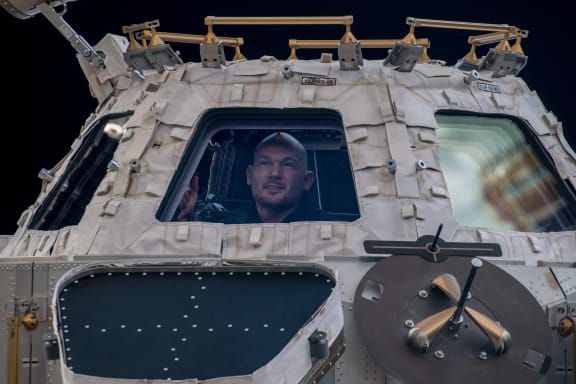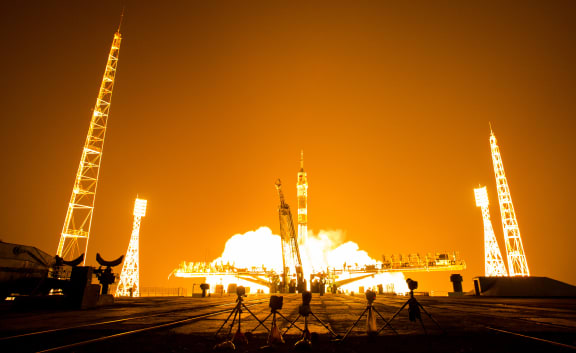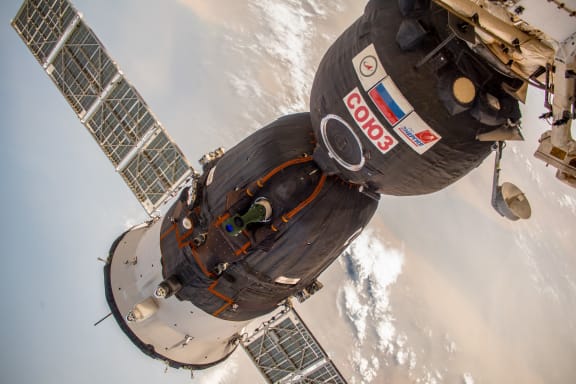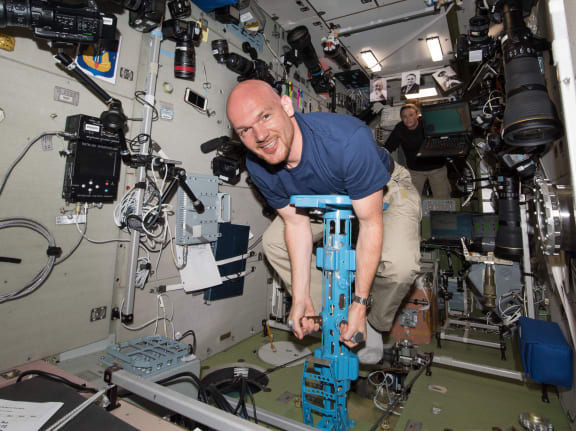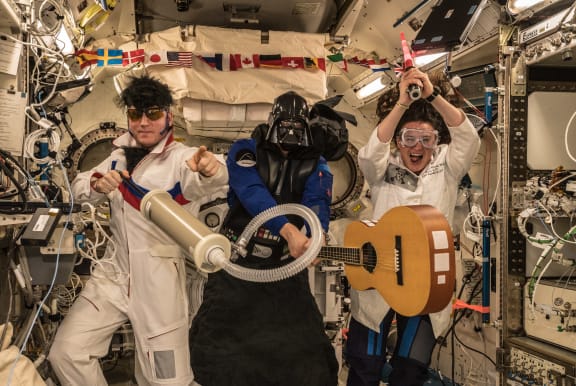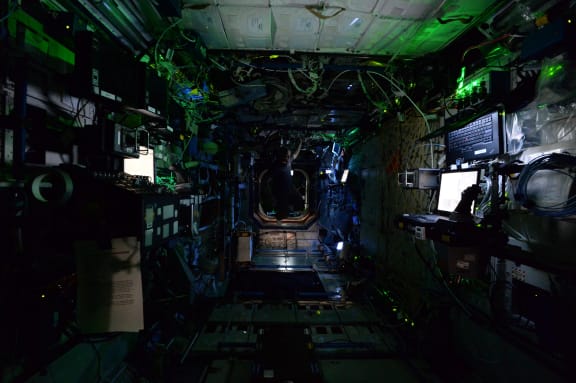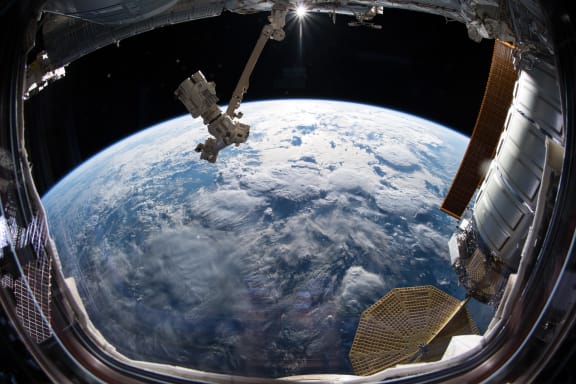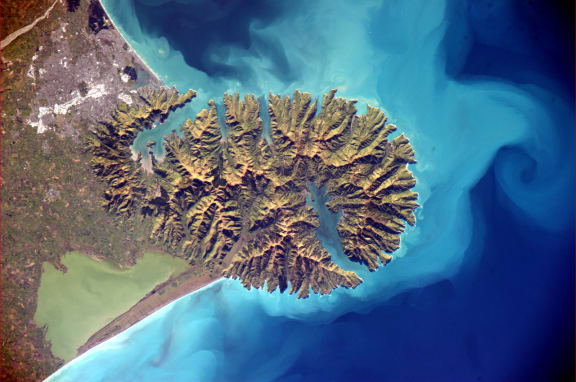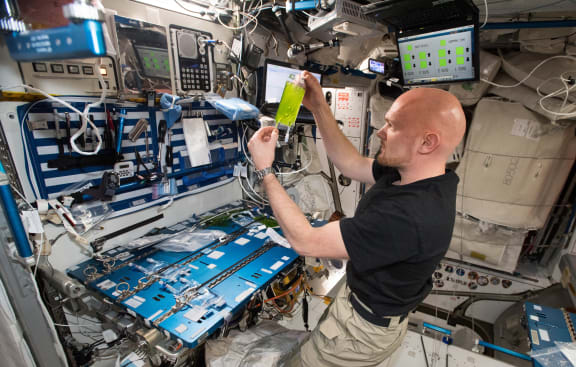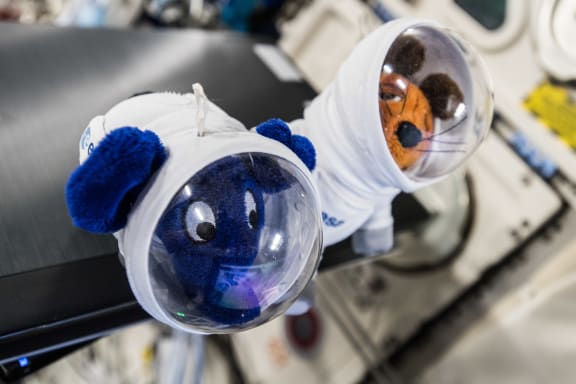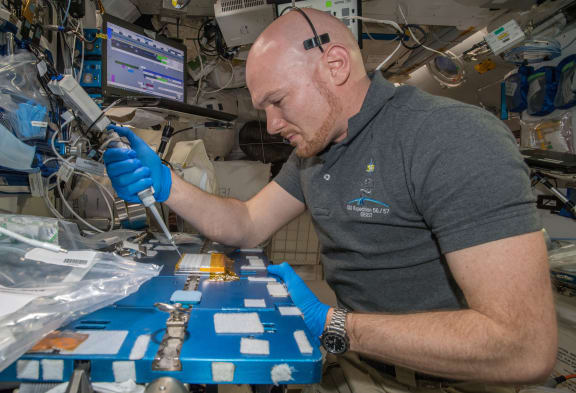Dr Alexander Gerst aka Astro Alex has spent almost a year in space, having completed two missions on the International Space Station (I.S.S.).
The European Space Agency (ESA) astronaut launched on a Soyuz spacecraft in Kazakhstan in May 2014 to serve six months as flight engineer, and returned last year as Commander of the I.S.S. for the Horizons mission, returning to Earth on 20 December 2018.
His onboard experiments and insights into what it’s like to live in space have won him a large social media following and plaudits as a science communicator.
He has been in New Zealand to receive a Distinguished Alumni Award from Victoria University of Wellington where he completed a Master’s in volcanology in 2003.
Dr Gerst tells Kim Hill he always dreamed of being an astronaut but thought it was unrealistic.
“I sort of knew I would not be an astronaut because it was just so unlikely that they would take me, so I never really factored that in.
“I had in the back of my mind that one time in my life I would give that dream a chance, mostly to get it done and over with and then continue on with what I enjoy doing.”
He says that he applied to the ESA along with around 10,000 other people, not imaging it would go anywhere. In fact, he already had a volcanology job lined up in Alaska.
“I handed in my application and I was really surprised when ESA called me and said; ‘Do you want to be an astronaut?'”
In 2009, he began the 18-month basic training and was lucky enough to get an assignment to the International Space Station almost immediately after he finished. That assignment, however, required another two years of training.
The ESA currently uses Russian Soyuz rockets and ships and launches from Kazakhstan, the same launchpad used by Yuri Gagarin, the first man in space.
“It worked so well, and that’s part of the Russian philosophy, they make changes to everything, but very gradually. They don’t do a massive overhaul of the computer system of a spaceship, they change out system by system, they test it out, they make improvements, and then they roll it in. It’s actually a very successful, clever way of gradually changing the design of your spaceship because it’s very safe.”
This is what a sunset on Earth looks like from above. / So sieht ein irdischer Sonnenuntergang aus, von oben gesehen. #Horizons #Archive pic.twitter.com/sgijQq8hYt
— Alexander Gerst (@Astro_Alex) May 16, 2019
Dr Gerst says that, adrenaline spikes notwithstanding, there’s nothing scary about the missions to the ISS.
“We train so much – emergency training is 70 percent of the training we do in the last six months – so we’re actually expecting things to go wrong and usually they don’t, and that means it’s not really scary anymore. To me, it’s amazing and fantastic.
“Fear is something irrational you feel if you’re losing control over a situation. If there was a fire in here and I felt my life in danger, I would have fear just as you would. But we’re trying to avoid that by training in all those situations, you always have a plan a, b, and c. We know what to do.”
Staying in shape is a big part of being at the ISS for six months so astronauts must work out for two hours a day. Dr Gerst says this is important because gaining or losing too much weight can affect positioning in seats which are specifically designed for your body shape.
He was surprised to find that after both expeditions, he had gained muscle mass in space.
More strange is sleeping on the Space Station. He says the astronauts have small cabins, about the size of a phone booth, with a sleeping bag which they simply float in. After a bit of an adjustment period, Dr Gerst actually found it quite comfortable.
“After two or three days getting used to the thought of being in space, I started sleeping really well. You don’t need a pillow, you don’t need to turn around.”
The Gateway
The next major international project is a large spaceship that will orbit the Moon called The Gateway. Dr Gerst says it will provide an exciting way to research the Moon and beyond.
“It’s a lunar orbital platform in an orbit, but it’s in a high orbit meaning it’s further away from the Moon than the ISS is from Earth. It’s really in a very loose orbit and that means, with its own thrusters, it can move into different orbits. It could even move further out, even towards Mars.
The beautiful Bay of Plenty in New Zealand, framing its smoking White Island volcano. I miss scrambling around on volcanoes. #Horizons #archive pic.twitter.com/zpxrBxMla8
— Alexander Gerst (@Astro_Alex) April 9, 2019
“You could call this a Mothership, it’s like the USS Enterprise [from Star Trek] that’s in an orbit around a planet and sends a little spaceship to the surface of the planet. And we’re planning to do that on the Moon.”
He says the Moon is our closest neighbour, only three days from Earth, and yet we don’t know it at all.
“A few decades ago we went there, we collected a few rocks, it’s not really even representative of the rest of the Moon, so we don’t know much about it. But the Moon is a very important archive for learning about ourselves, about the Earth.”
The Moon is probably a chunk of the Earth that was knocked into orbit when Earth was smashed by a large asteroid. Dr Gerst says this is why it’s so important to study.
“There’s no erosion on the surface of the Moon so we can read it and read our own history. We can also use it as a stepping stone further into space.”
The Gateway could potentially be used to protect Earth from asteroids. We currently cannot see all the potentially threatening ones coming our way from Earth, so The Gateway could provide larger coverage.
“Several times in the last year it happened that an asteroid, pretty big, moved between the Moon and Earth and we only learned about it afterwards.”
But what can we do about it if there is a large asteroid heading our way?
“That’s exactly what we’re planning next with a mission called Hera. The ESA plans to see if we can maybe just distract its path a little bit. Only a tiny bit of force is needed when it’s still far away, but when an asteroid is close to the Earth, you can’t do anything.”
Dr Gerst says ESA is proposing the technology in conjunction with NASA and says it could be vital for humanity at some stage.
The view from the Space Station
While journeying to the Space Station, the rocket only gives glimpses of Earth from a tiny window, but once up there they have a view of the planet unlike any other.
The ISS has telescopes pointed at Earth, but Dr Gerst says they’re not looking too closely.
“We’re trying to look for things we otherwise cannot see… the status of our atmosphere, our climate, our soil moisture, ocean salinity, all those parameters we need to understand climate change, to monitor it and counter-act it. More than half of those parameters can only be observed from space.”
There’s also a spectrometer pointed into space that’s looking for dark matter.
“They’ve found a lot of things that they cannot explain yet. They have hordes and hordes of physicists trying to figure out what it is, so it’s really interesting.”
How come every time I climbed Mt Taranaki in New Zealand, it was covered in clouds? / Wieso war Mt. Taranaki in Neuseeland eigentlich immer in Wolken, wenn ich ihn bestiegen habe? pic.twitter.com/c9EGkyZrak
— Alexander Gerst (@Astro_Alex) November 27, 2018
They can also see some human activity, but it tends to be tragic.
“One of the saddest things is that we do see war, we see rockets and bombs flying from several areas of the world. That’s very sad to see from up there – humans killing each other.
“And we do see the Amazon forest cut down, we do see lakes and glaciers disappear. We see atmosphere being pestered with smog.”
Dr Gerst says being up there has indeed changed his perspective of Earth.
“When I grew up on this planet, I think I was like everybody feeling like Earth was infinite, you look up in the sky and it looks blue and infinite. You don’t see that Earth is actually round when you stand on the surface, you think it’s just so huge and everything that’s on it, all the resources, are infinite.
“When you see it from space, it’s one of the first things you realise is that it’s really tiny. It’s just a tiny round rock with a breath of atmosphere and that’s all we have as humans that protects us from space. It’s terrifying, it changes your perspective. I came back realising we’re on a little boat or space ship together travelling around the sun all together once a year. If we’re out of resources, if we use them up, then we’re out, they’re gone. And we don’t have a Plan B.”
Life on Mars
Dr Gerst says that Elon Musk’s plan to make Mars inhabitable is unrealistic and there is no other place for humans to go.
“If you want to live on a desert planet in a container because you think that’s a good substitute for destroying our forests here on Earth, good luck with that because it’s not going to work.
“That’s why space agencies like ESA and NASA are saying we absolutely need to protect our planet – we need to do everything we can to protect this planet.”
Can you imagine – the whole of Lake Taupō in New Zealand is a single volcanic crater, and it is active. Imagine what it could do to us. We better make sure we understand our planet well... #Horizons pic.twitter.com/im9aMYekFQ
— Alexander Gerst (@Astro_Alex) November 25, 2018
He says that although Mars won’t sustain human life, it has a potential treasure trove of scientific discoveries that beg exploration.
“If we discover life existed on Mars, it will probably mean that life is everywhere in the Universe. It would probably mean that the Universe is full of life and that would mean, well maybe there’s rudimentary life on Mars, but if life can be generated that easily through the Universe, then it’s almost certain that somewhere out there there’s also more developed life.”
But would that be good news?
“It’s a really good question. I don’t know. My crew and I were sitting on the Space Station looking down and seeing things like war and destruction of our own forests that generate the oxygen that we breath and we thought, if there’s life forms out there that would visit us, they would probably observe us for a while. They would judge us.
“They would see exactly what we see, people killing each other, cutting down the forest that they need. What would they think of us? Would they think we’re a peaceful species? Would they think it’s worth contacting us? Would they think we’re intelligent life?”
Coming home
Dr Gerst says that although he feels incredibly heavy and earthbound when coming back from the ISS, he’s always happy to be back home.
“I left the Space Station with one crying eye, knowing that I might never see it again, this amazing place that I’ve really enjoyed living in, but also with a laughing eye knowing I could come back to this planet, to my family, my friends.”
He says he missed the experiences unique to Earth and on arriving back the first thing he wanted to eat was a fresh salad.
“I missed that so badly. Then, it’s the profane things, I wanted to have a BBQ with friends, go out on the back of the Rhine river and chat with friends and watch the water flow by. Very simple things, feel the sand on the bottom of my feet walking along a beach, feel the wind around my ears, the sound of leaves whistling in the wind.”
He says that we don’t realise how beautiful these things are because we experience them every day. Space changed that perspective for him.
“When I grew up I thought space was this amazing, special place. When you’re in space you realise the only special place there is, is Earth.
“When you’ve lived in space in a little tin can, in the vacuum, in the black, then seeing all this is such an amazing thing. I realised that Earth is really the place to be.”
